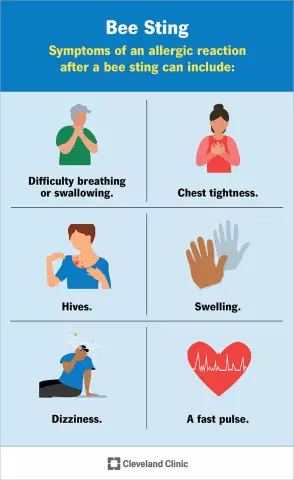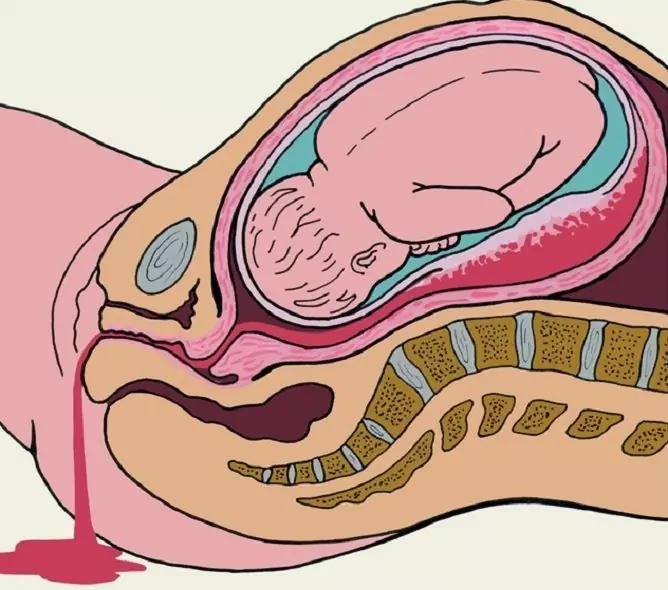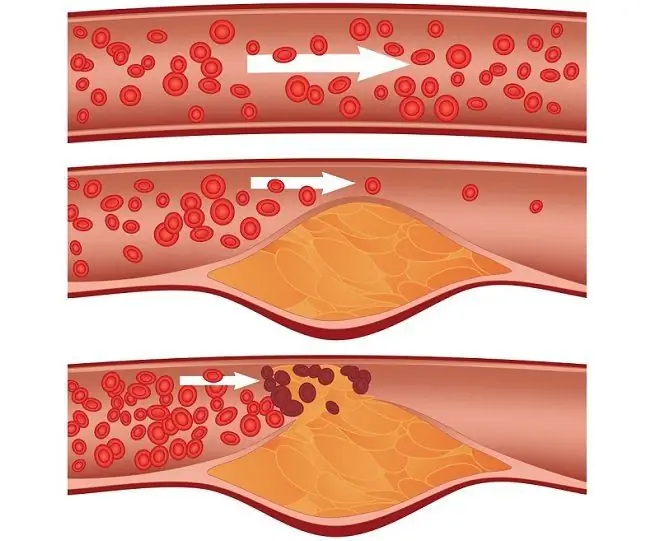- Author Rachel Wainwright wainwright@abchealthonline.com.
- Public 2023-12-15 07:39.
- Last modified 2025-11-02 20:14.
Anaphylaxis

Anaphylaxis is an acute and life-threatening reaction to a specific allergen that causes severe pain, swelling, muscle spasms, and suffocation. The reaction can appear both after an insect bite, and after taking medications or interacting with other allergens.
Causes and symptoms of anaphylaxis
Symptoms of anaphylaxis may appear immediately or several hours after allergic contact. The most common symptoms of anaphylaxis are swelling, severe pain, muscle spasm, redness, skin rash, itching, nausea, vomiting, and swelling of the respiratory system.
Late symptoms of the disease are bronchospasm, hoarseness and shortness of breath, hypoxia, urticaria, palpitations. The heart begins to work irregularly with interruptions and irregular contractions. If the patient is not helped, then anaphylaxis leads to a sharp drop in blood pressure, loss of consciousness and death.
The main cause of anaphylaxis is a certain allergen, which can be drugs and their components, insect venom, animal hair, plant pollen, food, etc. Sometimes at the first contact with the allergen, anaphylaxis does not appear, but with repeated interaction it develops quite quickly.
Allergies and anaphylaxis interfere with each other due to the presence of an allergen. Anaphylaxis can occur when an allergen enters the human bloodstream and reacts with immunoglobulin, resulting in the release of histamine and the formation of an inflammatory process.
Anaphylaxis can be caused by narcotic drugs and contrast agents, aspirin and non-steroidal drugs, which cause anaphylactoid reactions in people with chronic diseases. Allergies and anaphylaxis are closely related, as patients with allergic reactions are often prone to anaphylactic shock.
The main types of anaphylaxis
Anaphylaxis is of several types, depending on the type of allergen. The disease can be divided into several categories:
- food reaction;
- reaction to anesthesia during the operation and during rehabilitation;
- idiopathic reaction;
- drug, narcotic and non-steroidal reaction;
- reaction to physical activity;
- reaction to flora and fauna.

If symptoms of anaphylaxis appear, it is necessary to immediately determine the type of allergen and begin treatment. After suffering anaphylactic shock, the patient is at risk of a repeated reaction for several years.
Treatment for anaphylaxis
Treatment of anaphylaxis is carried out on an emergency basis and consists in the introduction of a certain dose of adrenaline. Patients who have chronic allergic reactions and have suffered anaphylactic shock should carry an adrenaline syringe with them.
With persistent symptoms of the disease, urgent hospitalization of the patient and intensive care are required. The patient should be under constant medical supervision until the physical condition stabilizes.
After anaphylaxis, the doctor monitors the functioning of the cardiovascular system, brain, respiratory system and digestive organs. The patient is regularly measured blood pressure and pulse, as well as prescribed a complete diagnostic examination.
To prevent the recurrence of anaphylaxis, immunotherapy is prescribed, which is designed to regulate the effects of allergens and prevent the development of inflammatory processes.
YouTube video related to the article:
The information is generalized and provided for informational purposes only. At the first sign of illness, see your doctor. Self-medication is hazardous to health!






